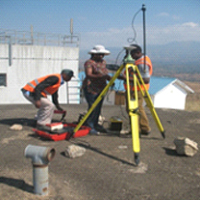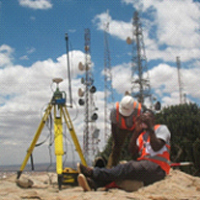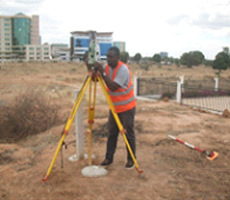Degree Programmes
The Department offers the following degree programmes:
- BSc in Civil Engineering
- BSc in Geomatics
- Postgraduate Diploma in Civil Engineering – Transportation Engineering Specialization
- Master of Science in Highway Engineering
Research Degree programmes include:
- MSc in Civil Engineering
- MSc in Transportation Engineering
- MSc in Geotechnical Engineering
- PhD in Civil Engineering
- PhD in Transportation Engineering
- PhD in Geotechnical Engineering
Forthcoming Degree Programmes
Curriculum development for the following programs have reached advanced stage and if approved may be offered soon.
- Postgraduate Diploma in Highway Engineering
- Master of Science in Geotechnical Engineering
- Master of Science in Highway Engineering and Management
- Master of Science in Transportation Engineering
- Master of Science in Ocean Engineering
Description of Degree Programmes
Bachelor of Science in Civil Engineering
This programme is offered jointly with the departments of Structural and Construction Engineering and Water Resources Engineering. Details of the programme are provided on the Structural and Construction Engineering Departmet’s webpage.
Bachelor of Science in Geomatics
Bachelor of Science in Geomatics is a four year programme offered by the Department of Transportation and Geotechnical Engineering from the 2015/16 academic year. Geomatics is a rapidly developing discipline that focuses on information that is associated with a specific location (spatial information) for example about the land, water bodies, natural resources, and infrastructures. The location is the principal factor for integrating wide range of data for spatial analysis, simulation, modelling and visualization. Geomatics includes several areas of study such as Land Surveying and Cartography. Thus the programme is structured to facilitate acquisition of knowledge and skills in the areas of spatial data provision, spatial information management and general land surveying and management. Students will be exposed to the current theory and participate in practical exercises and training in industry so that they can develop into well rounded professionals capable of solving challenges related to electricity, gas and water distribution networks, transportation networks including roads and railways as well as issues of land ownership, boundaries and terrain. Aspirants to the program should have a sound background in mathematics and other quantitative disciples including physics, geography and chemistry or computer science. One should be prepared to master the appropriate computer software and develop measurement skills in order to do well in the profession.
About eighty percent of government activities are spatial in nature and many graduates from the programme can expect to be employed by government ministries, municipal and town councils. Professionals in the discipline are usually responsible for the management of local, regional, national, and global Spatial Data Infrastructures (SDI) which is a platform for common standards and spatial data sharing.



Photo: Geomatics staff during field data collection.



Photo: Geomatics Lecturer describe on Leica Viva GNSS equipment to undergraduate students.
Postgraduate Programmes :
Postgraduate Diploma in Civil Engineering – Transportation
The Postgraduate diploma programme in Civil Engineering (with specialization in Transportation Engineering) consists of a progarmme of study involving the completion of a total of at least 22 units. Candidates must complete 14 compulsory core units including project in the general area of Civil Engineering and then select a specialization involving the completion of at least 8 units in Transportation Engineering. The main objective of this progarmme is to provide graduates with relevant modern knowledge in their field of specialization Transportation Engineering to meet the job market requirement. The candidate of this programme will also get additional qualifications so that they can manage to join relevant master’s programmes at the University of Dar es Salaam or any other university.
Master of Science in Highway Engineering
The highway Engineering programme was launched in the 1994/95 academic year as an integral part of the Integrated Road Project IRP. It was a joint concern of the University of Dar es Salaam, University of Birmingham and the Ministry of Works. Upon completion of the Integrated Road Project, the University of Dar es Salaam assumed full responsibility of running the programme. The Masters programme involves the completion of at least 36 units. Candidates must complete 30 compulsory core units including dissertation in their area of specialization an at least 6 units in elective courses. The major objectives on the Msc. in Highway Engineering programme is to equip engineers in the middle management positions with up-to-date knowledge of procedures, materials and technology which can enable them to efficiently manage the trunk and rural roads network. The programme is also aimed at providing a curriculum that covers techniques, which are appropriate for the local conditions in Tanzania as well as those of neighboring countries. This is especially important for engineers in private practice who are involved in planning, design and supervision of highway projects.
Research Degree Programmes
The Degree of Doctor of Philosophy (Ph.D.)
The department offers Doctor of Philosophy degree in Civil Engineering, Transportation Engineering and Geotechnical Engineering. The programme involves a minimum of three years for full-time candidates, or five year for part-time registered candidates.
Sandwich Programmes:
The CoET offers Ph.D. training by the sandwich mode. This is mainly in areas where the facilities and research infrastructure in CoET is deemed inadequate to provide quality research meriting the award of Ph.D. Training under the sandwich mode is also offered in line with the frameworks of collaborative research programmes with other universities.

